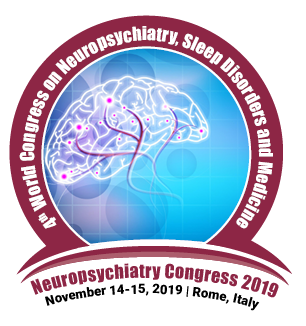4th World Congress on Neuropsychiatry, Sleep Disorders and Medicine
Rome, Italy
Dhondup Namgyal
Neuropsychology and Neuroscience,
Title: Dim Light Induced Neurotoxicity and Reversal effects of Curcumin
Biography
Biography: Dhondup Namgyal
Abstract
The prevalence of major stress and depressive like disorders has increased in recent years yet the
complete set of contributors remain unknown. The environmental and social changes have certainly
played a significant role in these symptoms. Our physiology and mental processes are influenced by
the environmental factors like temperature, light and dark cycles and other environmental factors in
which we live. Many of our biological systems are under circadian control, including sleep-wake
behavior, light-dark cycle, hormone secretion, cellular functions and gene expression.
In the past, our ancestor experienced a predictable period of light and dark which allowed them to
develop the intrinsic pattern of circadian rhythms in tune to the light and dark cycle. Ever since
technology brought changes in our circadian rhythm, the exposure to artificial light has dramatically
increased and along with that, disorders related to mental health has also increased. However, the
knowledge about how this alteration in light-dark phase of circadian rhythm changes our brain
anatomy level is poorly understood. Hence, in this study, we investigated the effect of chronic
exposure to 5 lux dim light at night for one week in swiss albino mice and analysed the effect on
their behavior. We have also investigated the brain derived neurotrophic factor expression level,
hippocampal synapsin II protein level and the Double cortin protein expression levels. In addition
we have also investigated the neuroprotective role of curcumin(30mg/kg and 50mg/kg) in mice
stressed due to dim light exposure at night.
From our study, it was found that even one week of exposure to dim light at night has dramatic
effects on the expression levels of proteins such as BDNF, synapsin II and DCX. We have also
found that the dim light at night had increased the oxidation levels and created certain changes in
their behaviour in terms of reduced learning capacity, inhibited locomotor activity and memory
retention with high stress levels. However, treatment of curcumin had effectively protected the
neuro-inflammation caused by the dim light at night. These results indicate that artificial light
exposure contributes to the rise of mood disorders and reveal curcumin to have an effective role in
the reversibility of depressive like behavior observed under chronic dim light at night.

